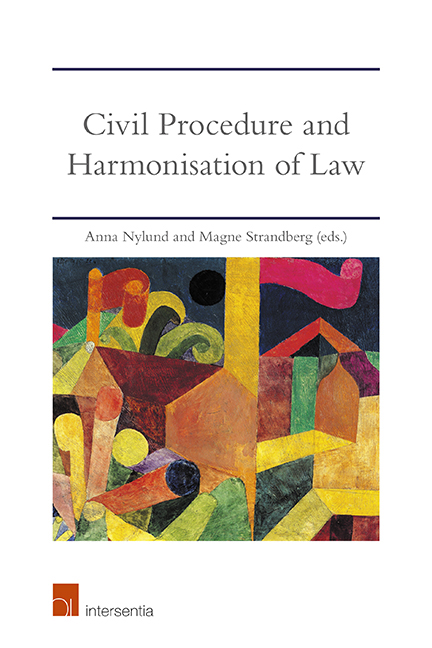Book contents
- Frontmatter
- Preface
- Contents
- List of Contributors
- List of Abbreviations
- Introduction
- EU Civil Justice at the Harmonisation Crossroads?
- The ELI-UNIDROIT Project: An Introduction and an English Perspective
- Europeanisation of Civil Procedure: Overcoming Follow-Up Fragmentation through Bottom-Up Harmonisation?
- Harmonisation or Fragmentation of National Law? An East Nordic Perspective
- An Examination of the Influence of European Union Law on English Civil Procedure
- The EU's Influence on Norwegian Civil Procedure through National Substantive Law
- Consumer Protection and EU-Driven Judicial Activism in the Netherlands
- The Role of the Judge in Consumer Cases – A German Perspective
- Ex Officio Application of the Unfair Terms Directive Cases against Consumers: A Swedish Perspective
- Ex Officio Application of EU Consumer Protection Law in Norwegian Courts
- Maintenance and Multi-Level Harmonisation: A European Union Perspective
- Family Maintenance and Multi-Speed Integration: A Norwegian Perspective
- Conclusions on Civil Procedure and Harmonisation of Law
- About the Editors
Europeanisation of Civil Procedure: Overcoming Follow-Up Fragmentation through Bottom-Up Harmonisation?
Published online by Cambridge University Press: 30 March 2019
- Frontmatter
- Preface
- Contents
- List of Contributors
- List of Abbreviations
- Introduction
- EU Civil Justice at the Harmonisation Crossroads?
- The ELI-UNIDROIT Project: An Introduction and an English Perspective
- Europeanisation of Civil Procedure: Overcoming Follow-Up Fragmentation through Bottom-Up Harmonisation?
- Harmonisation or Fragmentation of National Law? An East Nordic Perspective
- An Examination of the Influence of European Union Law on English Civil Procedure
- The EU's Influence on Norwegian Civil Procedure through National Substantive Law
- Consumer Protection and EU-Driven Judicial Activism in the Netherlands
- The Role of the Judge in Consumer Cases – A German Perspective
- Ex Officio Application of the Unfair Terms Directive Cases against Consumers: A Swedish Perspective
- Ex Officio Application of EU Consumer Protection Law in Norwegian Courts
- Maintenance and Multi-Level Harmonisation: A European Union Perspective
- Family Maintenance and Multi-Speed Integration: A Norwegian Perspective
- Conclusions on Civil Procedure and Harmonisation of Law
- About the Editors
Summary
Starting from the well-known fact that the European law of civil procedure is fragmentary by nature, this chapter points to the unwanted phenomenon of follow-up fragmentation on the Member State level and considers whether and to what extent this could be overcome through bottom-up harmonisation, i.e. autonomous reception of European solutions into national law.
STARTING POINT: LIMITED EUROPEAN COMPETENCE
CROSS-BORDER CASES
According to Article 81 of the Treaty on the Functioning of the European Union (TFEU), the European Union is competent to harmonise procedural rules for judicial co-operation in civil matters with cross-border implications. This explicitly includes the elimination of obstacles to the proper functioning of civil proceedings, if necessary by promoting the compatibility of the rules on civil procedure applicable in the Member States (Article 81(2)(f) TFEU). Over the years, an impressive number of legal instruments (regulations and directives alike) have been based on Article 81 TFEU, providing the area of freedom, security and justice with a finely-meshed and mainly well-functioning legal framework for international civil litigation.
Meanwhile, however, it seems as if the European legislative process is slowing down considerably, and the potential of Article 81 as a source for harmonisation in the field of civil procedure is almost exhausted. This is partly due to its express limitation to cross-border cases and partly due to the absence of political intent. But this is not a matter of course, as can be seen in the recent European Parliament resolution on common minimum standards of civil procedure in the EU. Seizing upon an opinion that has been expressed on many occasions in the past, most notably by the European Commission, the Parliament contended that the current interpretation of ‘cross-border implications’ is too narrow and should therefore be construed in a broader manner. As a consequence, the Parliament has made recommendations for a directive on common minimum standards of civil procedure that should be applicable even in cases in which both parties are domiciled in the same Member State as that of the court seized, provided either that enforcement of the judgment takes place in another Member State or that the matter in dispute falls within the scope of EU law.
- Type
- Chapter
- Information
- Civil Procedure and Harmonisation of LawThe Dynamics of EU and International Treaties, pp. 61 - 76Publisher: IntersentiaPrint publication year: 2019



